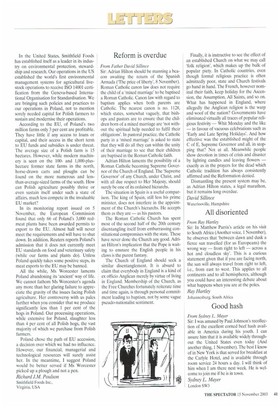Reform is overdue
From Father David Sillince Sir: Adrian Hilton should be manning a beacon awaiting the return of the Spanish Armada (The price of liberty', 8 November). Roman Catholic canon law does not require the child of a 'mixed marriage' to be baptised a Roman Catholic. Canon law with regard to baptism applies when both parents are Catholic. The nearest canon is no. 1128, which states, somewhat vaguely, that bishops and pastors are to ensure that the children born of a mixed marriage are 'not without the spiritual help needed to fulfil their obligations'. In pastoral practice, the Catholic party in a `mixed marriage' is asked to state that they will do all they can within the unity of their marriage to see that their children are baptised in the Roman Catholic faith.
Adrian Hilton laments the possibility of a Roman Catholic becoming Supreme Governor of the Church of England. The 'Supreme Governor' of any Church, under Christ, and with all due respect to Her Majesty, should surely be one of its ordained hierarchs.
The situation in Spain is a useful comparison. The king of Spain, still less his prime minister, does not interfere in the appointment of the Church's hierarchs. He accepts them as they are — as his pastors.
The Roman Catholic Church has spent most of the second half of the 20th century disentangling itself from embarrassing constitutional compromises with the state. These have never done the Church any good. Adrian Hilton's implication that the Pope is waiting to ensnare the English people in his claws is the purest fantasy.
The Church of England should seek a similar disentanglement. It is absurd to claim that everybody in England is a kind of ex officio Anglican merely by virtue of living in England. Membership of the Church, as the Free Churches fortunately reiterate time and time again, is through personal commitment leading to baptism, not by some vague pseudo-nationalist sentiment. Finally, it is instructive to see the effect of an established Church on what we may call 'folk religion', which makes up the bulk of popular piety. In Catholic countries, even though formal religious practice is often admittedly poor, state and Church festivals go hand in hand. The French, however nominal their faith, keep holiday for the Ascension, the Assumption, All Saints, and so on. What has happened in England, where allegedly the Anglican religion is the warp and woof of the nation? Governments have eliminated virtually all traces of popular religious festivity — Whit Monday and the like — in favour of vacuous celebrations such as 'Early and Late Spring Holidays'. And how effective was the established might of the C of E, Supreme Governor and all, in stopping that? Not at all. Meanwhile people show devotion in times of crisis and disaster by lighting candles and leaving flowers — exactly as in the prayers for the dead which Catholic tradition has always consistently affirmed and the Reformation denied.
Dismantling the present system may be, as Adrian Hilton states, a legal marathon, but it remains long overdue.
David Sillince
Waterlooville, Hampshire


























































































 Previous page
Previous page